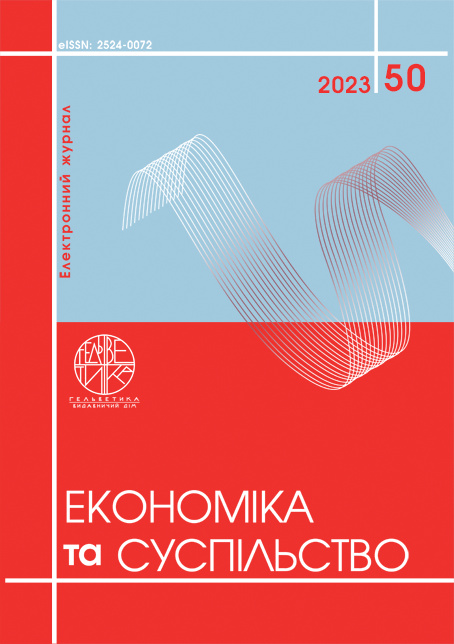SUSTAINABLE DEVELOPMENT IN THE CONTEXT OF GLOBALIZATION
Abstract
The article deals with regulative role of state in modern economies. The specificity of this role in a globalization context as well as impact of globalization on national economic systems are emphasized. The essence and characteristics of globalization shows its positive and negative effects on the development of national economies. Proved that globalization and increased international competition require new approaches to the development of national economies. Entered further study of globalization and the necessity of developing of national economies into these conditions. It is proved that the reproduction of the of the territory depends on the level of ensuring of safety. It is determined that the security depends on the political, social, demographic, scientific, technical, natural geographic and environmental factors. The structure of environmental factors that affect the ensuring of security is proved, namely the value of natural resource and assimilative potential of the territory and the extent of their use, human pressure on the environment and the level of economic sector’s ecology. While analysing the current state and contradictions of globalization processes, and the necessity of forming an effective institutional support for the development of the global economy. A qualitatively new stage in the formation of the world economy and the resolution of environmental problems has identified international and environmental integration, which should be the basis of the process of globalization. It is established that globalization is a process of deep and intensive development of economy, politics, social sphere that is unfolding at the international level under the influence of various global processes (movement of goods and services at the international level, factors of production, development of innovative resources, internationalization of industrial branches of economy, trans nationalization, infrastructure development, strategic management) and institutions (institutions of goods liberalization, institutions of regulation of economy, politics and social sphere), m Meanwhile what is effective transformation and the growing influence of global driving forces to the balanced development of individual countries.
References
Білорус О.Г. Мацейко Ю.М. Глобальна перспектива і сталий розвиток: системні маркетологічні дослідження. Київ : МАУП, 2005. 492 с.
Брижань І.А. Умови та чинники переходу України до моделі сталого розвитку. Вісник Полтавської державної аграрної академії. 2013. Вип. 1. С. 128–133.
Дідківська Л.І., Головко Л.С. Державне регулювання економіки : навч. посіб. 4-вид., випр. Київ : Знання, 2004. 213 с.
Кант И. К вечному миру. Москва, 1995. 480 с.
Мельник Л.Г., Сотник І.М., Чигрин О.Ю. Економіка природних ресурсів. Навч. посіб. Суми : Університетська книга. 2010. 346 с.
Развитие навстречу «зеленой» экономике. Материалы второй сессии Подготовительного комитета к Конференции Организации Объединенных Наций по устойчивому развитию (8 марта 2011 года, Нью-Йорк). URL: http://www.un.org/ru/development/desa/news/sustainable/development-greeneconomy.shtml
Сотник І.М. Ресурсозбереження та економічний розвиток України: формування механізмів переходу суб’єктів господарювання України до економічного розвитку на базі ресурсозберігаючих технологій : монографія. Суми : Університетська книга, 2006. 551 с.
Болдак А.О., Войтко С.В., Джигирей І.М. та ін. Сталий розвиток регіонів України. Київ : НТУУ «КПІ», 2009. 197 с.
Чоловська Н. Глобальна самоорганізація людства на засадах сталого розвитку. Вісник Львівського університету. Серія філософські науки. 2012. Випуск 15. С. 96–102.
Belarus O.G. Maceiko Yu.M. (2005) Hlobalna perspektyva i stalyi rozvytok: systemni marketolohichni doslidzhennia [Global perspective and sustainable development: systematic market research]. Kyiv: MAUP, 492 p.
Bryzhan I.A. (2013) Umovy ta chynnyky perekhodu Ukrainy do modeli staloho rozvytku [Conditions and factors of transition of Ukraine to the model of sustainable development]. Bulletin of the Poltava State Agrarian Academy. Issue 1. P. 128–133.
Didkivska L.I., Golovko L.S. (2004) Derzhavne rehuliuvannia ekonomiky : navch. posib. 4-vyd., vypr. [State regulation of the economy: education. manual 4-ed.]. Kyiv: Znannia, 213 p.
Kant I. (1995) K vechnomu miru [To eternal peace]. Moskva, 480 p.
Melnyk L.H., Sotnyk I.M., Chygrin O.Yu. (2010) Ekonomika pryrodnykh resursiv. Navch. posib. [Economics of natural resources. Training manual]. Sumy: University book, 346 p.
Development towards a "green" economy. Materials of the second session of the Preparatory Committee for the United Nations Conference on Sustainable Development (March 8, 2011, New York). URL: http://www.un.org/ru/development/desa/news/sustainable/development-greeneconomy.shtml
Sotnyk I.M. (2006) Resursozberezhennia ta ekonomichnyi rozvytok Ukrainy: formuvannia mekhanizmiv perekhodu subiektiv hospodariuvannia Ukrainy do ekonomichnoho rozvytku na bazi resursozberihaiuchykh tekhnolohii: monohrafiia [Resource conservation and economic development of Ukraine: formation of mechanisms for the transition of economic entities of Ukraine to economic development based on resource-saving technologies: monograph]. Sumy: University book, 551 p.
Boldak A. O., Voitko S. V., Dzhigirei I. M. and others (2009) Stalyi rozvytok rehioniv Ukrainy [Sustainable development of the regions of Ukraine]. Kyiv: NTUU "KPI", 197 p.
Cholovska N. (2012) Hlobalna samoorhanizatsiia liudstva na zasadakh staloho rozvytku [Global self-organization of humanity on the basis of sustainable development]. Bulletin of Lviv University. Series of philosophical sciences, no. 15, pp. 96–102.

This work is licensed under a Creative Commons Attribution 4.0 International License.


